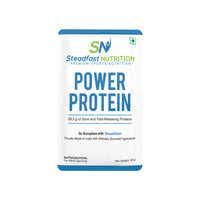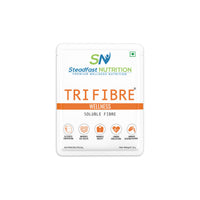Losing weight is similar to making a complicated recipe - it calls for the correct components, exact measurements, and patience. First, because our bodies are complex systems, varied factors, including metabolism and heredity, can affect our weight. There is no one solution that fits all people.
Fast remedies frequently provide only temporary effects. Sustainable lifestyle adjustments are necessary for long-term success but take time to implement.
Change is not something that happens quickly. It is the outcome of gradual, little efforts made over time. Thus, losing weight requires patience but the benefits are worth the wait. Think of it like a slow-cooked meal. However, one should not get swayed into fad diets but focus on healthy living by following a high protein diet and low carb diet (when required) and proper exercise.
How Protein Works in the Body
Have you ever heard trainers discussing the benefits of protein for weight loss? If not directly, protein does play a vital role in weight loss. Let’s learn how! Besides providing energy (four calories per gram), protein, a necessary macronutrient along with fat and carbs, is essential for tissue growth and repair, metabolic processes, and the proper operation of our body's systems.
Proteins comprise chains of amino acids, and the kinds of amino acids they include determine the structure and function of the proteins. Plant-based foods like legumes, nuts, soy, and seeds are also good sources of protein, even though animal sources, including meats, poultry, fish, eggs, and dairy have higher protein concentrations.
Other benefits of protein in the body are manifold, ranging from improving body composition and supporting general health to supporting the development and maintenance of lean muscle tissue. Protein maintains the body's structural integrity and durability by promoting the growth and fortification of lean muscle. Furthermore, it is essential for maintaining a good balance between muscle mass and fat, helping to refine body composition. Beyond these physical benefits, protein is generally a pre-requisite for good health, supporting a range of biological processes and fostering overall well-being.
How to calculate your protein Intake?
As per the recommendation of ICMR and NIN 2020, the recommended daily allowance (RDA) value of protein is 0.83 g per kg of body weight per day. It is imperative to meet your protein intake to function well. Moreover, if your goal is to lose weight, your protein intake would depend on the below-mentioned factors:
- Body Weight
- BMR (Basal Metabolic Rate)
- Fitness Goals
- Physical Activity Level (Sedentary/Moderate/Heavy)
- Any underlying health conditions
- Ongoing medication, if any
You’ll find a lot of protein calculators on the web - many individuals often consider them as calculated by a professional. However, one should consult a professional nutritionist or dietitian since they go through an individual’s medical history besides cross-checking the above-mentioned parameters. If you are looking for a team of certified nutritionists to cater a tailor-made weight loss diet plan for you, Nutrition Daily can be your one-stop shop!
How Protein Helps in Weight Loss
Well, protein for weight loss is a real thing. The effects of protein on weight loss are complex, including on metabolism, regulation of hunger, and composition. Let’s dive into the concept of protein for weight loss and how protein can help us lose weight.
Protein Helps Boost Metabolism
Thermic Effect of Food (TEF):
Digestion of protein needs more energy than lipids or carbohydrates. Protein contains roughly 20–30% of calories, used during digestion and metabolism, increasing total energy expenditure.
Preservation of Lean Muscle Mass:
When losing weight, the body frequently uses fat and muscle tissue as fuel. Consuming enough protein ensures that the body uses fat for fuel primarily and helps maintain lean muscle mass.
Protein Helps Maintain Body Composition
Reduction of Fat & Preserving Muscle:
Protein for weight loss will not work like a magic pill since the macronutrient directly doesn’t promote weight loss. But when trying to lose weight, consuming more protein may result in more fat reduction, while maintaining muscle mass. For improving one's body composition and metabolic rate, this is crucial.
Supports Healthy Metabolism:
Protein preservation leads to a higher basal metabolic rate, which can help you burn more calories even when you're at rest.
Protein helps Regulate Appetite
- Enhanced Satiety: A low carb diet is often suggested for weight loss but you feel more hungry. Well, in this situation, a high-protein diet can help. Protein has a strong satiety component that keeps you fuller for extended periods, which helps regulate appetite. Protein can help control hunger hormones like gherkin and increase the release of hormones like peptide YY and GLP-1 that promote feelings of fullness.
- Lessened Cravings & Snacking: Including protein in meals can help reduce cravings and the urge to snack in between meals, which can reduce total calorie intake.
How to Reap the Benefits of Protein in your Weight Loss Journey?
- Balanced Meals: Try eating well-balanced meals - with enough healthy fats, carbohydrates, and protein. Every meal should include significant protein to promote satiety and muscle preservation.
- Timing and Distribution: Distribute your daily dose of protein equally throughout the day. Protein may be optimally utilised for hunger management and muscle maintenance by having it with every meal and snack.
- Diverse Protein Sources: Include lean meats, chicken, fish, eggs, dairy, legumes, nuts, seeds, and plant-based substitutes like tofu or tempeh in your diet.
- Meal Prep and Planning: Making a meal plan helps guarantee that you have access to protein-rich foods when you need them, lowering the chance of reaching for less wholesome options.
High-Protein Food Sources
From vegetarian to non-vegetarian options, the Indian taste palette includes varied high-protein food sources to suit different dietary requirements.
Plant-Based Sources:
- Legumes and Pulses: Typical ingredients in Indian meals such as dals, curries, and soups are protein-rich legumes such as mung beans (moong dal), kidney beans (rajma), black-eyed peas (lobia), and lentils (dal).

- Cottage cheese, or paneer: Potassium-rich and a multipurpose dairy product, paneer is used in recipes such as matar paneer, palak paneer, and paneer tikka.

- Soy-based products: Tofu, soy chunks, and soy granules are common ingredients in Indian cooking and can be added to stir-fries, curries, and snacks.

Non-vegetarian Food Sources
- Chicken and Fish: Well-liked and high-protein options include fish curry, tandoori chicken, chicken curry, and grilled fish dishes.

- Eggs: Throughout Indian cuisine, eggs are frequently used in curries like egg curry and breakfast dishes like masala omelettes.

- Lean Meats: When turned into curries or grilled meals, recipes with lean portions of lamb, goat (mutton), or cattle can supply an adequate amount of protein.

Tips and Supplements for Weight Loss
Experts say that while many vitamins and minerals help people maintain a healthy weight, doing so frequently calls for a balanced, nutrient-dense diet. However, according to experts, people often eat the same things over and over again in today's fast-paced lifestyle, which may mean they don't get the diverse nutrition their bodies require. Here are the main areas experts advise concentrating on to address this.
Protein Powder:
Through multiple processes, including periods of satiety (especially when following a low carb diet), increased energy requirements for digestion, and support for the maintenance of metabolically active lean muscle, protein helps reduce body weight. Reports suggest the body needs to use more energy to break down proteins than it does to break down fats or carbohydrates because of their intricacy. You may burn a few extra calories daily by increasing the amount of protein in your diet.
Additionally, by decreasing hunger and extending satisfaction, including protein shakes in your diet may help you lose weight. To improve sensations of fullness and satiety, protein should be a part of every meal and snack.
Premium protein powder supplements from Steadfast Nutrition can be helpful if getting enough protein from food sources is difficult. When curating a high-protein diet plan, the unbeatable recovery range by Steadfast Nutrition will help maintain lean muscle mass and nourish muscles as you lose weight.
Metabolism Booster:
A premium-grade, well-researched metabolism booster like LeanFast from the house of Steadfast Nutrition can also support weight loss. It consists of ingredients like L-carnitine, L-tartrate, green coffee bean extract, green tea extract, caffeine anhydrous, coleus root extract, black pepper extract, and chromium that improve processes involved in burning fat and also control glucose metabolism, which contribute to weight loss. This promotes the body's general metabolic process, boosting metabolism and calories.
The three ingredients in LeanFast L-carnitine, coleus root extract, and black pepper extract play the most important role in weight loss.
- L-carnitine helps with fat oxidation by making it easier for fatty acids to enter cells and be used as fuel, which promotes fat burning and helps with weight loss.
- Coleus root extract regulates how the body reacts to food-induced thermogenesis, increasing basal metabolic rate and improving fat metabolism.
- Black pepper extract enhances metabolic health and digestion as it contains piperine, an active ingredient. Due to the thermogenic qualities of black pepper, calories are burned more quickly and fat buildup is reduced.
Fibre:
One of the many health benefits of increasing your fibre consumption is that it can help you manage your weight. Focusing on getting 30 grams of fibre every day can improve your body's insulin response and help you lose weight. This method can be just as successful as well-known, complex diets that restrict particular foods or demand close adherence to regulations.
If you consider using a fibre supplement, Steadfast Nutrition’s TriFibre may increase the feeling and duration of fullness, lessening the desire to overindulge in snacks and consume extra calories. Although several meals are high in fibre, you can also add a TriFibre supplement to your diet.
In the end, before beginning any weight loss programme, regimen, or diet, it is essential to consult a physician or qualified dietitian for advice if your efforts to adopt healthy living choices do not result in the much-needed weight loss outcomes. A free tip for you: With the professional experience of Nutrition Daily, you may create a safe, customised treatment plan that works for you.



